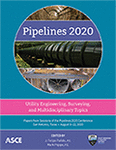Pipelines 2020
Evaluation of Artificial Intelligence Tool Performance for Predicting Water Pipe Failures
Publication: Pipelines 2020
ABSTRACT
Over the past years, there has been a sustained interest in developing machine learning (ML) models that are sophisticated enough to capture the failure trends of water distribution systems and that are able to predict future breaks of the pipeline system. Given the limited budgetary resources of water pipeline owners, coupled with the deteriorated state of water networks, there is a vital need to deploy such tools to prioritize inspection and replacement of vulnerable regions, as well as to mitigate the chance of having catastrophic failures within the system. This study extends several ML algorithms that analyze the historical failures of water pipelines, with the goal to predict future breaks. The performance of each algorithm has been examined using various water networks as different case studies with varying network size and configurations. The developed models are all aimed to estimate the future likelihood of pipe failure by exploring historical failure patterns, surrounding attributes (e.g., environmental and demographic), as well as pipe characteristics. To improve the predictive power of the learning algorithms, several engineered features have been also created from raw data and tested to facilitate the learning process of each algorithm. While developing such models is by no means an insignificant task, an equally, if not more important emphasis should be put on how precisely these models are predicting actual failures. Additionally, the model variables should be defined wisely enough to ensure the uniqueness of each network has been captured and incorporated into the analysis. Lastly, it is crucial to evaluate the precision of the developed predictive models to evaluate the level of reliability a utility can expect by deploying it, as well as the further improvement needs of the predictive algorithm itself. Accordingly, this paper will review the analyses performed, the outcomes of this study, and discuss plans to improve upon the analyses to ensure that maximum usefulness of the model can be achieved.
Get full access to this article
View all available purchase options and get full access to this chapter.
REFERENCES
Chen, T. Y. J., Beekman, J. A., David Guikema, S., & Shashaani, S. (2019). Statistical Modeling in Absence of System Specific Data: Exploratory Empirical Analysis for Prediction of Water Main Breaks. Journal of Infrastructure Systems, 25(2), 04019009.
De Oliveira, D. P., Neill, D. B., Garrett Jr, J. H., & Soibelman, L. (2010). Detection of patterns in water distribution pipe breakage using spatial scan statistics for point events in a physical network. Journal of Computing in Civil Engineering, 25(1), 21-30.
Jenkins, L., Gokhale, S., & McDonald, M. (2014). Comparison of pipeline failure prediction models for water distribution networks with uncertain and limited data. Journal of Pipeline Systems Engineering and Practice, 6(2), 04014012.
Nicklow, J., Reed, P., Savic, D., Dessalegne, T., Harrell, L., Chan-Hilton, A., … & Zechman, E. (2009). State of the art for genetic algorithms and beyond in water resources planning and management. Journal of Water Resources Planning and Management, 136(4), 412-432.
Rajani, B., & Makar, J. (2000). A methodology to estimate remaining service life of grey cast iron water mains. Canadian Journal of Civil Engineering, 27(6), 1259-1272.
Sadrfaridpour, E., Jeereddy, S., Kennedy, K., Luckow, A., Razzaghi, T., & Safro, I. (2016). Algebraic multigrid support vector machines. arXiv preprint arXiv:1611.05487.
Thornton, J., Sturm, R., & Kunkel, G. (2002). Water loss control manual (p. 526). New York: McGraw-Hill.
Tran, D. H., Ng, A. W. M., & Perera, B. J. C. (2007). Neural networks deterioration models for serviceability condition of buried stormwater pipes. Engineering Applications of Artificial Intelligence, 20(8), 1144-1151.
Winkler, D., Haltmeier, M., Kleidorfer, M., Rauch, W., & Tscheikner-Gratl, F. (2018). Pipe failure modelling for water distribution networks using boosted decision trees. Structure and Infrastructure Engineering, 14(10), 1402-1411.
Yerri, S. R., Piratla, K. R., Matthews, J. C., Yazdekhasti, S., Cho, J., & Koo, D. (2017). Empirical analysis of large diameter water main break consequences. Resources, Conservation and Recycling, 123, 242-248.
Zhang, B., Guo, T., Zhang, L., Lin, P., Wang, Y., Zhou, J., & Chen, F. (2018). Water pipe failure prediction: A machine learning approach enhanced by domain knowledge. In Human and Machine Learning (pp. 363-383). Springer, Cham.
Zheng, A., & Casari, A. (2018). Feature engineering for machine learning: principles and techniques for data scientists. “O’Reilly Media, Inc>”.
Information & Authors
Information
Published In
Pipelines 2020
Pages: 203 - 211
Editors: J. Felipe Pulido, OBG, Part of Ramboll and Mark Poppe, Brown and Caldwell
ISBN (Online): 978-0-7844-8321-3
Copyright
© 2020 American Society of Civil Engineers.
History
Published online: Aug 6, 2020
Published in print: Aug 6, 2020
Authors
Metrics & Citations
Metrics
Citations
Download citation
If you have the appropriate software installed, you can download article citation data to the citation manager of your choice. Simply select your manager software from the list below and click Download.
